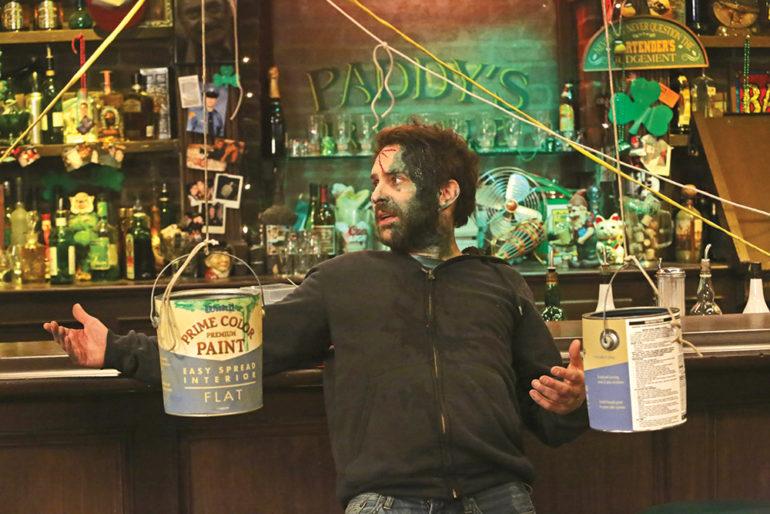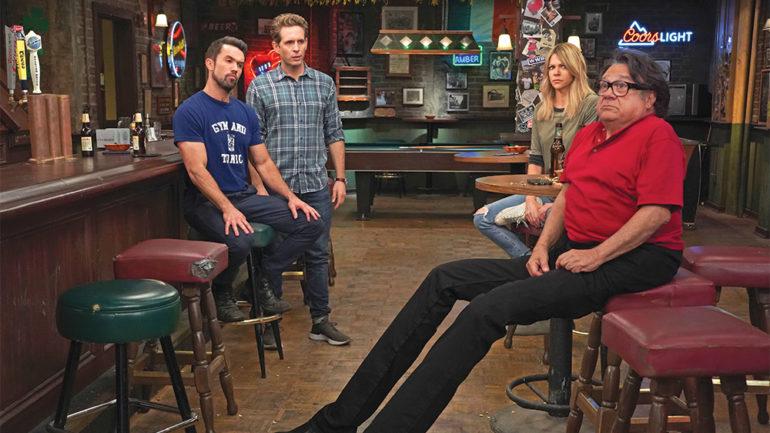FX’s ‘It’s Always Sunny in Philadelphia’ Takes an Unlikely Path to TV History
By Joe Otterson
LOS ANGELES (Variety.com) – A group of friends hang out in a bar. It’s a typical sitcom setup. But “It’s Always Sunny in Philadelphia” has never been typical — and FX Entertainment president Eric Schrier can attest to that. He was one of the executives “laughing our asses off” a decade and a half ago at a screening of the show’s pilot.
“I think what was so great about it was that it was an alternative version of a sitcom, where you had these crazy characters that said and did all things totally politically incorrectly,” he says. “But there was a smarter understanding behind the show. They were dealing with societal issues, so there was this great combination of a highbrow side of it masked with a very broad-based lowbrow side.”
The single-cam series, which debuted in 2005 on , will air its 14th season this month. In doing so, it will tie “The Adventures of Ozzie and Harriet” for longest-running live-action TV comedy in history, making it an unlikely entry into the television pantheon. “Always Sunny” has now aired more seasons than “Cheers,” “MASH,” “Seinfeld,” “Friends” or “Frasier.”
“Always Sunny” was one of FX’s first originals, airing alongside early hits like “The Shield,” “Rescue Me” and “Nip/Tuck.” It is also FX’s longest-running show, period. Its core cast — Rob McElhenney, Glenn Howerton, Charlie Day, Kaitlin Olson and — has remained intact virtually throughout its run.
The show has endured in part because of its willingness to push the boundaries of comedy. Topics lampooned on the series have included pedophilia, incest, racism, alcoholism, abortion and the gun debate — and that was just in Season 1. Its main characters all work at a fictional Philadelphia bar called Paddy’s Pub, where they engage in various schemes and illicit dealings for personal gain or simply to undermine each other.
The show also helped redefine what a comedy, particularly one on basic cable, was capable of in the early aughts. One need only look at the shows that were up for the best comedy Emmy in 2005 — “Everybody Loves Raymond,” “Arrested Development,” “Will & Grace,” “Scrubs” and “Desperate Housewives” — to see how the landscape has changed in the years since “Always Sunny” started.
The show connected early with college-age men. But DeVito notes that longevity has brought with it a broader audience.
“I’ve experienced this where 11-year-olds will come up to me on the street,” DeVito says. “Almost the same fans as ‘Matilda’! I expect them to say, ‘I’m such a big fan of “Matilda,”’ but this kid goes, ‘My favorite was the water park episode!’ I think of it, and I say to myself ‘Holy s–t, I was running around in that one talking about having AIDS to get to the front of the line of a water slide.’”
“Always Sunny” has never been a favorite of the awards community. In fact, the show did an entire episode spoofing exactly that in its ninth season. The plot revolves around the gang trying to win the award for best bar in Philadelphia; the episode ends with Day’s character singing a song to awards voters in Paddy’s Pub that culminates with him belting out, “Go f–k yourselves,” and spitting on the bewildered patrons.
Yet the series remains popular even after more than a decade. According to FX, the 13th season averaged just over 3 million viewers per episode in multiplatform viewing. That’s up from 2.2 million multiplatform viewers in Season 10.
Part of the show’s early appeal was its almost homemade aesthetic, which was influenced by the original pilot that McElhenney, Day and Howerton shot for next to nothing with a digital camera before pitching it to various networks.
“We knew what we liked, but we didn’t know how things were supposed to be done,” Howerton says. “It was sort of that bullheaded attitude and being told, ‘You can’t do it that way,’ that emboldened us.”
All three agree, however, that they’re glad they knew so little going in about making a show, something McElhenney calls a “trial by fire.” He does say there’s one thing he would change though: “To remember to enjoy the process a little bit more, which we certainly started to do as time went on,” he says. “When we started, I was 25 or 26, and I so desperately didn’t want to wait tables anymore that I was willing to do anything and everything to make sure that this was going to succeed. We just killed ourselves to make sure that it held up to a certain standard, which I’m proud of doing, but at the same time it wasn’t as enjoyable as it could have been if we lightened up a little bit.”
“It was sort of that bullheaded attitude and being told, ‘You can’t do it that way,’ that emboldened us.”
That early effort has clearly paid off, with all of the core cast members pursuing successful projects since the show began. DeVito continues to star in films like the live-action “Dumbo”; Howerton toplines the comedy series “AP Bio,” which was recently revived for a third season at the NBCUniversal streaming service after two seasons on NBC; Olson starred in the Fox series “The Mick”; and McElhenney and Day are prepping a comedy series for Apple.
Howerton is also branching out within “Always Sunny,” making his directorial debut in the new season. He says it was always his intention to start directing on the series, but he held off until now. “The reason I haven’t done it before, besides the fact it’s hard to do because we shoot multiple episodes at one time, is I have a tremendous amount of respect for directors and what that takes,” he says. “I never wanted to just jump into it like, ‘Oh, I could do this.’”
But one of the drawbacks of being on a series as successful as “Always Sunny” is that network executives are essentially expecting the same show when they hear about a new project.
“Rob and I went through that with our Apple show,” Day says. “There’s always some expectation that they’re going to get ‘Sunny,’ but then there is always the hope that they are going to get us as a cast. ‘Sunny,’ beyond the writing, is us performing and the chemistry that we have together. So there is the hurdle of saying, ‘Well, you’re not going to get that, but you are going to get something great.’”
Olson echoes that sentiment, saying she’s often pitched projects in which she would basically be playing her character from “Always Sunny,” adding those shows “just aren’t as well written.” “I would love to play some other characters in some different endeavors, but it’s nice to be able to come back here because I realize how great we have it.”
“I really feel like I hit the jackpot,” she continues. “It’s hard to imagine another show ending up as fun and as special as this one.”


